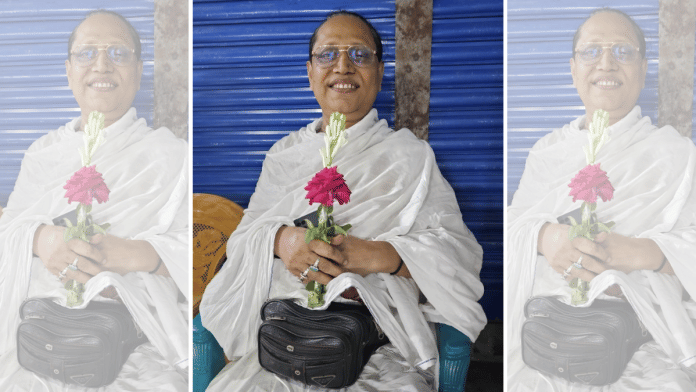New Delhi: A prominent baul singer’s arrest over alleged blasphemy charges has sparked a storm in Bangladesh with various stakeholders protesting over growing ‘religious fascism’ in the country.
Baul singers are mystic religious singers found predominantly in West Bengal and Bangladesh. The religious order consists of both Hindu Vaishnaviites and Muslim Sufi saints. Baul music is an important part of Bangladesh’s cultural heritage and has often led to tensions with conservatives over religious non-conformity or alleged irreverence.
The unrest began earlier this month after prominent baul singer Abul Sarkar, also called Maharaj, was arrested from Manikganj on 7 November over alleged blasphemy charges.
He has been jailed under Sections 153, 295-A, and 298 of the Penal Code, accused of deliberately provoking riots or violence and hurting religious sentiment. All these offences carry a maximum sentence of less than two years.
The complaint was lodged by the imam of Ghior Bandar Mosque, who claimed Sarkar insulted Islamic beliefs, hurt religious sentiments, and made derogatory comments with the intention of inciting communal unrest at a folk event in Ghior, Maniktala on 4 November.
Sarkar’s co-singer alleged that the videos from his performance were deliberately distorted and that Sarkar had apparently called out fundamentalists at the event. After the video clips went viral, a human chain protest rally by the Alems-Ulama and Tawhidi Janata was held, demanding strict action against him.
Tawhidi Janata or monotheistic mass is an Islamist movement that has often been involved in political violence and protests across Bangladesh. It has also been linked to the radical Islamist group, Hefazat e Islam. In 2019, they vandalised the home of a Hindu teenager over ‘defaming’ Islam on social media and were also linked to the 2021 attacks on Durga Puja pandals across Bangladesh.
The 2025 protests on women playing football, the November 2024 cancellation of the Sufi festival in Narayanganj—a first in Bangladesh’s history—have all been linked to Hefazat e Islam.
‘A suffocating situation’
On Monday, around 250 civil society members denounced the arrest and made a statement which said that “a particular group has emerged as a ‘sole agent’ of Islam, embarking on a purge across the country.”
“In the period following the July mass uprising, religious extremism has surged. A particular group seems to have emerged as ‘sole agents’ of Islam, embarking on a purge across the country,” the statement read.
The statement was signed by prominent academicians and economists, some of whom were equally critical of the Sheikh Hasina-led Awami League and have now rained down on the Muhammad Yunus administration.
“Demolishing more than 200 shrines, declaring countless individuals murtad-kafir-shatim, exhuming and burning body, forcibly cutting the hair of bauls and fakirs on the street, harassing women over movement and attire, and disrupting programmes involving dance, music, theatre, and even sports and fairs — eradication of people of different opinions and practices appears to be their objective,” it added.
Economists Professor Anu Mohammad and Prof Salimullah Khan, who were among the signatories, said it was evident that those entrusted with maintaining law and order were not taking any effective steps to stop “mob terror or vigilantism.”
“Rather, from the outset they have encouraged it (mob violence) by maintaining silence — trying to downplay incidents by calling them ‘pressure groups’, and even detaining victims or attacking survivors in fabricated cases,” the statement read according to a Daily Star report. “They are creating a ‘suffocating situation’. The weapon of choice that has been used repeatedly is that of ‘hurting religious sentiments’.”
Rights groups and activists also condemned the move. Prominent poet and activist Farhad Mazhar warned of a new form of “religious fascism” on the rise in Bangladesh as he took part at a protest rally in Dhaka.
“We are now witnessing another kind of religious nationalism. This is religious fascism. Its journey began after 5 August through the desecration of mazars,” he said.
Mazhar, incidentally, is also married to Farida Akhter, an advisor in the interim Yunus led administration.
“Since last year, mobs under the banner of ‘Touhidi Janata’ have disrupted cultural gatherings and demolished multiple sufi shrines, sending a troubling message — the state is gradually failing to protect minorities,” a Business Standard—a Bangladeshi daily newspaper—article noted, adding that this is a “political struggle over public space, cultural identity and the very character of the new Bangladesh promised by the July Uprising”.
Pluralism, protests & politics
Across campuses, student groups in Dhaka University and Jahangirnagar University and cultural activists held torch marches Sunday. Simultaneously, baul singers protested in front of the National Press Club as well. The situation turned worse after four baul singers were attacked Wednesday by the Tawhidi Janta at a protest rally for Sarkar’s release.
The next day, protesters were attacked in various parts of Bangladesh, including Khulna where a human chain was formed to protest attacks on shrines and mazars, Bengali daily newspaper Prothom Alo reported.
While Yunus did not issue any condemnation, his press adviser Shafiqul Alam called the incident ‘deplorable’ while the cultural affairs adviser, Mostafa Sarwar Farooki, in a Facebook post, said, “Ministry of Home Affairs is trying to handle this ‘extremely delicate and sensitive matter’ with the utmost responsibility.”
He then, however, went on to add that this was a common occurrence even during Hasina’s rule. “You will find numerous instances where bauls were attacked—their hair cut off, their instruments destroyed.”
Soon, the newspapers called out Farooki’s “rather poor defence”. “This is not a new cultural rift but an old ideological trench widening under new political conditions. Condemnation without action rings hollow—especially when attackers operate publicly and with apparent impunity,” an article in Business Standard argued.
(Edited by Tony Rai)






